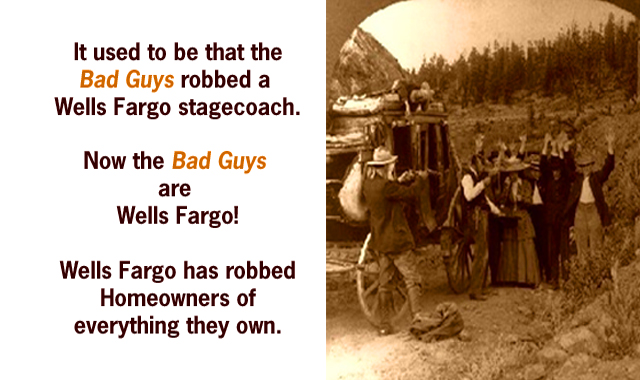Shareholders and Robosigning: Is Wells Fargo Ruling a Portent?
The state and federal regulators who announced the $25 billion foreclosure settlement with five major banks last week aren’t the only folks complaining about robosigning. The exposure of that practice — in which bank representatives, in order to speed up foreclosures, signed thousands of mortgage-related affidavits without actually reading them — sparked the nationwide foreclosure investigations that led to the $25 billion settlement. The robosigning scandal also spawned shareholder derivative suits. Board members at Bank of America, Citigroup, Wells Fargo, and JPMorgan Chase have all been accused of breaching their duty to shareholders by permitting robosigning and other flawed foreclosure practices to take place.
Last week U.S. District Judge Susan Illston of San Francisco federal court ruled that shareholders can proceed with their case against Wells Fargo board members. In a 13-page opinion, the judge found that the plaintiffs, represented by Robbins Geller Rudman & Dowd and Barrett Johnston, had adequately alleged the futility of demanding action from the Wells Fargo board because board members’ “substantial likelihood of liability for breach of fiduciary duty” presented a conflict of interest. Illston pointed to allegations that at the same time the bank was attempting to stymie a federal investigation of its foreclosure practices, board members signed a proxy statement advising shareholders to vote down a proposed internal investigation because it was already cooperating with the government. “If, as alleged, defendants did not disclose material information within the board’s control, defendants breached their duty of loyalty to the company,” Illston wrote.
Catch the rest here…
~


http://www.scribd.com/doc/81843675/FORECLOSURE-IN-CALIFORNIA-A-CRISIS-OF-COMPLIANCE-SAN-FRANCISCO-FEBRUARY-2012-PREPARED-BY-AEQUITAS-COMPLIANCE-SOLUTIONS
FORECLOSURE IN CALIFORNIA A CRISIS OF COMPLIANCE SAN FRANCISCO | FEBRUARY 2012 PREPARED BY AEQUITAS COMPLIANCE SOLUTIONS, INC.
http://www.scribd.com/doc/81843675/FORECLOSURE-IN-CALIFORNIA-A-CRISIS-OF-COMPLIANCE-SAN-FRANCISCO-FEBRUARY-2012-PREPARED-BY-AEQUITAS-COMPLIANCE-SOLUTIONS
BLOOMBERG REPORTED TODAY THE HEAD OF THE WORLD BANK IS CALLING IT QUITS……!!……FINITO….STICK A FORK IN HIM…..HES DONE….!!….IT MIGHT JUST BE TIME FOR A BANKSTER BBQ….LETS SUE THE UN FEDERAL RESERVE BANK…….!!!!!….HOW DO YOU LIKE OR BANKSTERS COOKED AMERICA……?? WELL DONE, CRISPY OR CHARRED….?….PERSONALLY I WOULD LIKE TO SEE ALL OF THE BANKSTERS, THEIR OWNERS AND CRIMINAL INVESTOR FRIENDS AND ALL POLITICAL TRAITORS CREMATED…!!!
Ivent
Thank you for your support. Why can’t we all buy sgares of Citimortgage, Bank of America is only $7 plus 7 is only $14 to become a shareholder. We need to keep the pressure on however we can.
Stan
Racine WI
Stanley…why don’t WE THE PEOPLE just CUT TO THE CHASE….AND SUE THE UN FEDERAL RESERVE BANK…??? THEIR UNCONSTITUTIONAL.AND THEREFORE ILLEGAL MARK OF BEAST IS THEIR ENTIRE MONETARY SYSTEM…..666….!! WE THE PEOPLE CAN RECOUP ALL OF OUR HIJACKED, STOLEN WEALTH….ISSUE OUR OWN CURRENCY AS THE U.S. CONSTITUTION REQUIRES…..BACKED BY OUR RECOUPED, STOLEN WEALTH….OPEN STATE BANKS…HOLD ALL POLITICAL TRAITORS ACCOUNTABLE..OFF WITH THEIR HEADS…….!!! NATIONAL SOVEREIGNTY, FREEDOM AND PROSPERITY WILL PREVAIL….!!!! GOD BLESS AMERICA……WE THE PEOPLES HO– USE…….!!!!!!
Everyone
I just went on Scottrade and bought 1 share of Wells fargo (WFC) for $3o plus $7 commission. I am now a shareholder and I will complain about the robosigning and the false affidavits to evict my 92 year old Mother out of her house. She may become a shareholder also.
Stan
Racine WI
You tell em Stanley….those fraudulent MBS’S……THOSE FAKE, PHONY COPIES OF THOSE CANCELLED BY MASSIVE FRAUD, MORTGAGES AND NOTES they are still peddling and using to STEAL THE HOMES AND BUSINESSES OF THE AMERICAN PEOPLE ARE A NULLITY…NULL AND VOID!!!!
They are…FINITO..STICK A FORK IN THEM…THEY ARE DONE!!
http://livinglies.wordpress.com/2012/02/13/barry-fagan-presses-harder-on-wells-fargo/
Please make sure that you file your complaints with the office of the president, each time you speak with a W f rep Note their name I D and what state they are in. Create a history of your discussion, that way it is allowed as evidence , begin with a Q W R and a validation of debt . Do your home work and verify the current standing of the MBS Trust where the Mortgage is held . Just recently over 90 b in MBS from W F are not in compliance , Therefore the trust loses it’s REMIC benefits, Under the PSA of the Trust they have 90 day to bring it mark to market or make the servicer buy back the note and refund your money , Conitnue fighting the bank fraud . Shoot me a private email and I can provide more information to assist you .